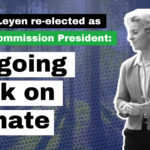With a minimal agreement on the pathway to defining an ambitious binding climate agreement in Paris in 2015, the climate conference in Warsaw pushed most of the work that needs to be done way ahead. While the EU fought for a robust timetable for putting emission reduction commitments for the new Treaty on the table, it failed to provide the necessary incentives to get all developing countries on board, especially the emerging economies.
Despite some EU Member States making individual finance announcements, amongst others to fill the gap in the Adaptation Fund, they refused to provide certainty on public finance provision, particularly for adaptation, to meet the Copenhagen commitment of 100bn USD a year by 2020. Further more, the EU failed to unlock progress on short term climate action, not least because the EU itself, while projected to overshoot its 2020 target seven years ahead of time, is unable to ramp up its ambition.
“EU Heads of State and Government have another chance to take a leadership role, by adopting an ambitious set of 2030 targets in March of next year,” said Wendel Trio, Director of CAN Europe. “Doing so would incentivise and challenge other countries, such as China and the US, to prepare to bring commitments to the Climate Leaders Summit organised by UN Secretary General Ban Ki-Moon in September of next year. “
“We won’t see EU leadership without France and Germany pushing together for three ambitious EU targets for emission reductions, renewables and energy efficiency,” Trio concluded. France will host the decisive 2015 climate conference. Germany will pre-decide its position in its ongoing coalition negotiations.”
[ends]
Contacts:
Wendel Trio, Director, wendel/at/caneurope.org
Vanessa Bulkacz, Communication Manager, vanessa/at/caneurope.org


